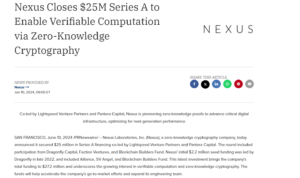YEREVAN (CoinChapter.com) — Nexus, a firm developing a decentralized supercomputer, recently hosted a five-day testnet that attracted participation from over 1.5 million nodes across 187 countries. The testnet demonstrated substantial global engagement, with 800,000 web nodes and 700,000 command-line interface nodes coming online. More than 100,000 concurrent nodes operated at maximum capacity, showcasing significant interest in the concept of a global computing network.
The project focuses on aggregating computing power from devices worldwide to create a global distributed network. Nexus raised $25 million in Series A funding in June to support its development. The initiative aligns with efforts to enable a “Verifiable Internet” powered by decentralized resources.
Nexus Secures $25M Funding. Source: prnewwswireMobile Participation Drives Network Growth
A notable outcome of the testnet was the high level of mobile participation in blockchain computing. Approximately 37% of the network traffic originated from mobile devices. Countries like Ethiopia and Poland saw higher mobile activity than desktop-based engagement, reflecting the accessibility of the system.
“We knew we had to lower the barrier of entry to scale this global distributed network, so we made it easy for anyone to connect to the network with any device,”
said Daniel Marin, CEO of Nexus.
Nexus zkVM Testnet Announcement. Source: XThe testnet validated global interest in combining blockchain and AI computing. However, Marin stated that further scalability is required to sustain and expand the network’s global infrastructure.
Decentralized Network with Centralized Program Selection
Despite operating as a decentralized supercomputer, Nexus maintains control over the programs run on its network. According to Marin, the company approves the programs provided on the platform after a thorough review process. This ensures that all software deployed aligns with the project’s standards.
The approach is reminiscent of earlier distributed computing initiatives, such as SETI@home, which utilized internet-connected devices to search for extraterrestrial intelligence. Although SETI@home ended in 2020, its concept continues to inspire similar projects, including Nexus.
Other Players in Blockchain-Based Computing
Nexus is part of a broader movement in decentralized computation. Platforms like Internet Computer, Golem Network, and Zennet are also building infrastructures to leverage distributed computing power. These projects highlight growing global demand for trust-driven systems that integrate blockchain and AI computing.





